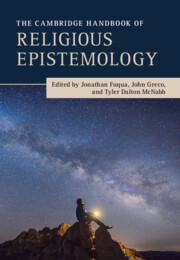Book contents
- The Cambridge Handbook of Religious Epistemology
- Cambridge Handbooks in Philosophy
- The Cambridge Handbook of Religious Epistemology
- Copyright page
- Contents
- Tables
- Contributors
- Introduction
- Part I Faith and Rationality
- Part II Religious Traditions
- 8 Jewish Religious Epistemology
- 9 Christian Religious Epistemology
- 10 Islamic Religious Epistemology
- 11 Hindu Religious Epistemology
- 12 Buddhist Religious Epistemology
- Part III New Directions
- References
- Index
11 - Hindu Religious Epistemology
from Part II - Religious Traditions
Published online by Cambridge University Press: 24 August 2023
- The Cambridge Handbook of Religious Epistemology
- Cambridge Handbooks in Philosophy
- The Cambridge Handbook of Religious Epistemology
- Copyright page
- Contents
- Tables
- Contributors
- Introduction
- Part I Faith and Rationality
- Part II Religious Traditions
- 8 Jewish Religious Epistemology
- 9 Christian Religious Epistemology
- 10 Islamic Religious Epistemology
- 11 Hindu Religious Epistemology
- 12 Buddhist Religious Epistemology
- Part III New Directions
- References
- Index
Summary
This chapter will illustrate the triple weave of epistemology, metaphysics, and soteriology in Advaita Vedanta, focusing on that advanced by the master exponent of Advaita, Shankara (c. 800 CE). Drawing from the work of Alvin Plantinga and William Alston, the paper will show that Shankara’s soteriological and metaphysical reflection is supported by internalist and externalist epistemologies, with the most important being internalist, owing to Shankara’s metaphysical presuppositions. These epistemological heuristics are deployed to gain insight into Shankara’s religious epistemology and then to stimulate an extended discussion of – and argument for – the epistemic merit of religious testimony and religious experience. Successfully doing all this will illuminate the epistemic value of those two mechanisms but also illustrate the triple weave of philosophical reflection in India, a single intellectual rope, as it were, now constituted by the strands of metaphysics, epistemology, and soteriology. While the focus of the chapter is Shankara’s thought, it will point to other Indian thinkers and systems that similarly – and, arguably, invariably – employ this threefold strand of reasoned reflection to establish and advance their own fundamental philosophical positions.
Keywords
- Type
- Chapter
- Information
- The Cambridge Handbook of Religious Epistemology , pp. 163 - 177Publisher: Cambridge University PressPrint publication year: 2023

